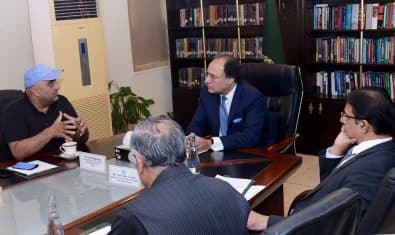Prime Minister Imran Khan chaired a meeting of the Federal Cabinet on Tuesday. The cabinet applauded the government’s policies, instrumental in successfully managing the COVID pandemic, Ehsaas poverty alleviation initiative, and environmental protection measures, particularly the 10 billion tree tsunami program that has been acknowledged by international organizations.
The Information Minister, Fawad Chaudhry, briefed the cabinet regarding the inflated import bill. He informed that the reason behind the surge in import bill is due to the import of COVID-19 vaccines worth over $2 billion. He added that the Federal Government provided Rs. 111 billion to the Sindh government under the head of importing coronavirus vaccine and Ehsaas program. He further informed that while Punjab had allocated Rs. 400 billion for the Health Insaf Cards, the Sindh government has not shown interest in becoming part of the initiative.
To curtail the spread of COVID-19, the cabinet emphasized the use of face masks, maintaining social distancing, and completion of vaccinations. Minister for Planning, Development & Special Initiatives, Asad Umer, briefed the cabinet regarding the new variant of COVID-19, Omicron. It was informed that the new variant is rapidly spreading across the globe., and the positivity ratio in Pakistan has increased.
SAPM Dr. Faisal Sultan briefed the cabinet regarding National Health Cards and universal health coverage. The cabinet was apprised that the National Health Cards program will facilitate the provision of quality health services in far-flung areas and the development of the private health sector.
This program will also improve service delivery in basic health units in rural areas and government hospitals. Universal health coverage will create a competitive environment for service delivery and create opportunities for public-private partnerships. There is a misconception that this program will affect government hospitals adversely, rather, it will help in improving the quality of public sector health facilities, Dr. Faisal informed. Pakistan’s National Health Card program is a unique initiative in the developing world. The government of Punjab has allocated Rs. 400 billion for health cards.
The cabinet was briefed regarding the use of Electronic Voting Machines and voting rights for overseas Pakistanis. The cabinet unanimously expressed that the use of EVMs is now more than ever necessary after complaints of irregularities in the recently held local bodies elections in Khyber Pakhtunkhwa.
Finance Minister appraised the cabinet regarding weekly prices of essential commodities. It was informed that weekly inflation had recorded a decrease of 0.5 percent while prices of food items have recorded an average decrease of 0.7 percent. Moreover, prices of 33 items have decreased.
The cabinet decided that the ambassadors of foreign countries posted in Pakistan shall only contact Federal Cabinet members and Federal Ministries through the Foreign Office of Pakistan.
The cabinet approved the placement of the “Statement of Contingent Liabilities” with Finance Supplementary Bill before the National Assembly of Pakistan.
The cabinet approved the extradition of accused Abdul Qadar Ahsan from Pakistan to the UK. This approval has been granted on the request of the accused to face charges against him in the UK Courts.
The cabinet approved the appointment of Mr. Nadir Mumtaz Warraich as Chairman, Karachi Port Trust.
The cabinet approved the reconstitution of the Pakistan Tobacco Board. The reconstituted board will now be comprised of members from Federal Government, Provincial Governments, and private trade associations.
The cabinet approved the appointment of Dr. Aziz-ullah Khattak as a Member (Economic Statistics), Dr. Muhammad Asif Khan as a Member (Resource Management), and Mr. Muhammad Sarwar Gondal as a Member (Support Services) in the Pakistan Bureau of Statistics.
The cabinet granted ex-post facto approval of MoU signed between the Government of China and CPEC Authority Pakistan. Under this MoU, China will provide 3,000 solar power generation systems to be provided to households in Gwadar free of cost.
The cabinet approved the appointment of Brig. Muhammad Asim Ishaq as Managing Director National Radio Telecommunication Corporation (NRTC).
The cabinet approved the appointment of Bilal Anwar as CEO of the National Disaster Risk Management Fund (NDRMF).


























